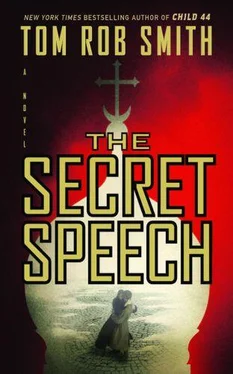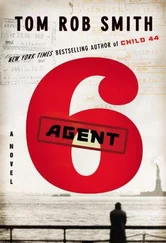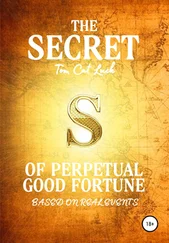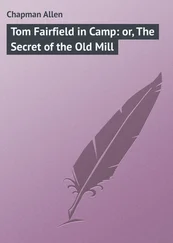Tom Smith - The Secret Speech
Здесь есть возможность читать онлайн «Tom Smith - The Secret Speech» весь текст электронной книги совершенно бесплатно (целиком полную версию без сокращений). В некоторых случаях можно слушать аудио, скачать через торрент в формате fb2 и присутствует краткое содержание. Жанр: Триллер, на английском языке. Описание произведения, (предисловие) а так же отзывы посетителей доступны на портале библиотеки ЛибКат.
- Название:The Secret Speech
- Автор:
- Жанр:
- Год:неизвестен
- ISBN:нет данных
- Рейтинг книги:5 / 5. Голосов: 1
-
Избранное:Добавить в избранное
- Отзывы:
-
Ваша оценка:
- 100
- 1
- 2
- 3
- 4
- 5
The Secret Speech: краткое содержание, описание и аннотация
Предлагаем к чтению аннотацию, описание, краткое содержание или предисловие (зависит от того, что написал сам автор книги «The Secret Speech»). Если вы не нашли необходимую информацию о книге — напишите в комментариях, мы постараемся отыскать её.
The Secret Speech — читать онлайн бесплатно полную книгу (весь текст) целиком
Ниже представлен текст книги, разбитый по страницам. Система сохранения места последней прочитанной страницы, позволяет с удобством читать онлайн бесплатно книгу «The Secret Speech», без необходимости каждый раз заново искать на чём Вы остановились. Поставьте закладку, и сможете в любой момент перейти на страницу, на которой закончили чтение.
Интервал:
Закладка:
Unsure what he was going to do, he ran along the tunnel, entering their stinking lair. Fraera claimed they were living in the remains of an ancient library, the lost library of Ivan the Terrible which once held a priceless collection of Byzantine and Hebrew scrolls. Illiterate and hiding in a library — the irony had never occurred to him before, not until Zoya arrived. Ancient library or not, he considered their base little more than a network of ugly, damp stone chambers. Avoiding the others, who were drinking as always, he made his way silently toward Zoya’s cell.
He retrieved the footstool and stood on it, looking through the bars. Zoya was asleep in the corner, curled up on her mattress. There was a lantern hanging from the ceiling — out of reach, always lit so that she was under constant scrutiny. Immediately Malysh’s anger changed. His eyes drifted over her body, watching her sleep, the slow rhythm of her chest rising and falling. Though he was a vory he was also a virgin. He’d murdered but he’d never had sex, a source of great amusement to the others. They teased him, saying if he didn’t use his prick soon it would get infected and fall off and he’d be nothing more than a girl. After his initiation they’d taken him to a prostitute, pushing him into the room and closing the door, ordering him to grow up . The woman had been sitting on the bed, bored, naked, goosebumps on her arms and legs. She’d been smoking a cigarette — a long stub of ash arching off the end — and all Malysh could think about was whether the hot ash was going to fall on her breasts. She’d tapped it onto the floor and asked what he was waiting for, nodding at his crotch. He’d fumbled at his belt, taking it off and then putting it back on again, telling her he didn’t want to have sex, she could keep the money just so long as she said nothing to the others. She’d shrugged, told him to sit down, they’d wait five minutes and then he could go, no one would believe he could last longer than that anyway. They’d waited five minutes. He’d sat on the bed and then he’d left. As he’d walked down the corridor, preparing his lie, she’d called out to the others that they’d been right. He’d chickened out. The vory had cackled like witches. Even Fraera had seemed disappointed in him.
Hearing someone behind him, Malysh spun around, drawing his knife. His hand was caught, fingers gripped, the knife taken from him. Closing the blade and handing him the knife back, Fraera leaned over his shoulder, looking into the cell:
— Beautiful, isn’t she?
Malysh didn’t reply. Fraera looked down at him:
— It’s rare that anyone is able to sneak up on you, Malysh.
— I was checking on the prisoner.
— Checking?
He blushed. Fraera put her arm around him, adding:
— I want her to accompany you on your next job.
Malysh looked up at Fraera:
— The prisoner?
— Use her name.
— Zoya.
— She has more reason than most to hate Chekists. They murdered her parents.
— She can’t fight. She’d be useless. She’s just a girl.
— I was just a girl, once.
— You’re different.
— So is she.
— She might try and run away. She’d shout for help.
— Why don’t you ask her? She’s listening.
There was a silence. Fraera called into the cell:
— I know you’re awake.
Zoya sat up, turning to face them. She spoke out:
— I didn’t claim that I wasn’t.
— You are brave. I have a proposition for a brave young girl. Do you want to accompany Malysh on his next assignment?
Zoya stared at him:
— To do what?
Fraera answered:
— To murder a Chekist.
KOLYMA
GULAG 57
SAME DAY
THE TWO VAKHTA HAD COLLAPSED into smoldering heaps, the bulk of the timber burnt through, reduced to red embers and occasional flickering flames. Wisps of smoke trailed the night sky, carrying up the ashes of at least eight guards: their final act on earth to block out a streak of stars before being scattered across the plateau. Fallen Gulag guards, those killed outside the firetrap of the vakhta , lay where they’d died, dotted across the camp. One body hung out of a window. The ferocity with which he’d been killed suggested that he’d been particularly vicious in his duties — chased by angry prisoners, eventually caught, beaten and stabbed as he’d desperately tried to clamber out. His body had been left, draped over the windowsill, the flag of their newly formed empire.
The surviving guards and Gulag personnel, some fifty in total, had been gathered in the center of the administration zone. Most were injured. Without blankets or medical care, huddled on the snow, their discomfort was met with indifference, a lesson well learned by the prisoners. In evaluation of Leo’s ambiguous status he’d been classified as a guard rather than a prisoner, forced to sit, shaking with cold, observing the old power structures collapse and new ones form.
As far as he could ascertain there were three unelected leaders, men whose authority had been established within the microcosm of their barracks. Each man had his own band of followers, distinctly defined. Lazar was one leader. Those who followed him were older prisoners, the arrested intellectuals, craftsmen — the chess players. The second leader was a younger man, athletic, handsome, perhaps a former factory worker — the perfect Soviet, and yet imprisoned all the same. His followers were younger, men of action. The third leader was a vory. He was perhaps forty, with thin eyes and jagged teeth, a shark’s smile. He’d taken possession of the commander’s coat. Too long for him, it dragged across the snow. His followers were the other vory : thieves and murderers. Three groups, each represented by their leader, each with competing points of view. The clashes of opinion were immediate. Lazar, voiced by red-haired Georgi, counseled caution and order:
— We must establish lookouts. We must take up arms along the perimeter.
After many years of practice Georgi was able to speak at the same time as listening to Lazar:
— Furthermore, we must protect and ration our food supplies. We cannot run amok.
The square-jawed worker, clipped from a reel of a propaganda movie, disagreed:
— We are entitled to as much food as we can get our hands on and any drink we can find as compensation for lost wages, as a reward for winning our freedom!
The reindeer-coat vory made only one demand:
— After a lifetime of rules, disobedience must be tolerated.
There was a fourth group of prisoners, or rather a nongroup, individuals who followed no leader, intoxicated on liberty, some running like wild horses, bolting from barrack to barrack, exploring, whooping at unidentifiable pleasures, either turned mad by the violence or mad all along and able to express it at last. Some were asleep in the guards’ comfortable beds: freedom being the ability to close their eyes when they were tired. Others were doped up on morphine, or drunk on their former captors’ vodka. Laughing, these men cut strips out of the wire fences, turning the hated barbed wire into ornamental trinkets with which they decorated the guards who once commanded them, pressing barbed-wire crowns onto their heads, mockingly referring to them as the sons of God and calling out:
— Crucify the fuckers!
Witnessing the anarchy orbiting them, Lazar pressed his argument, whispering to Georgi, who repeated:
— We must protect supplies as a matter of urgency. A starving man will eat himself to death. We must stop cutting the wire. It is protection from the forces that will inevitably arrive. We cannot counsel absolute freedom. We will not survive.
Читать дальшеИнтервал:
Закладка:
Похожие книги на «The Secret Speech»
Представляем Вашему вниманию похожие книги на «The Secret Speech» списком для выбора. Мы отобрали схожую по названию и смыслу литературу в надежде предоставить читателям больше вариантов отыскать новые, интересные, ещё непрочитанные произведения.
Обсуждение, отзывы о книге «The Secret Speech» и просто собственные мнения читателей. Оставьте ваши комментарии, напишите, что Вы думаете о произведении, его смысле или главных героях. Укажите что конкретно понравилось, а что нет, и почему Вы так считаете.












